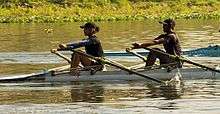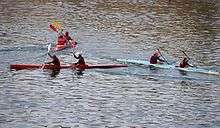COEP Regatta
The Regatta is an annual boat festival organised by the students of the College of Engineering Pune. The festival, which has a history of 86 years, is a major attraction for the people of Pune and every year draws crowd in a very large amount. Regatta means a series of boat races. The same types of regattas were held by CoEP which have undergone considerable changes with time, and now the present type of regatta is one of its kind. The participants of Regatta go through rigorous practice during the preparation tenure.[1] The event is the biggest of the Boat Club of the college, which organizes the event along with many other events throughout the year. The event takes place on the river Mula, on which the boat club of CoEP is based.[2]
History
The CoEP boat club was established in 1928-29. Since then, CoEP annual Regatta is taking place.Arrow formation was the prime event of Regatta since its inception.Initially, boats were taken from a British company called AYLING and AFCO, a Mumbai-based company. The very next year, Amateur Rowing Association of East(ARAE), was established, which later went on to manage the Regattas. In 1943, the Boat Club purchased Eighters, and became the first boat club in India to own the same. After the British left India in 1947, their private boats, like diamond sculls, were purchased by CoEP. The same year, the College started to form Boat Club Managing Committee(BCMC), Rowing Committee, Regatta Management Committee(RMC), to ensure more student participation in organization.[3]
Events
The Regatta primarily comprises five events Kayak Ballet, Shell Games, Telematches, Punt Formation and Mashaal Dance, and also the introductory event Arrow formation. Arrow formation consists of creating an arrow shape using different types of boats to be used in the event, thereby introducing the different types of boats to the audience.[4] On the penultimate day of Regatta, an event called "Alumni Regatta" is organised specially for the Alumni of CoEP. Prior to the Regatta day, boat races take place, whose winners are also felicitated on the Alumni Regatta day. Every year, the shows are based on a particular theme, according to which the participants are trained.
Arrow formation
This is the introductory event of Regatta. Many kinds of boats like Kayaks, punts, scunts, sculls, are used in this. A massive scull, called eighter, the biggest boat of the CoEP boat club, is also presented in this. The boats create a shape of an arrow which is said to signify the "aim" of the show, of entertaining the masses.
Shell games

This event consists of boats called sculls. These boats have to be propelled with two oars, one on either side. The scull may be single or double depending on the number of participants in that scull.
Kayak ballet

This consists of various dynamic shapes created by use of very unstable boats called Kayaks. The Kayaks are given different colours. The Kayak Ballet is extremely known for its Speed which makes it one of the most thrilling parts of Regatta. This event is presented using K1 (one person), K2 (2 person) and K4 (4person) Kayaks.
Telematches
Telematches is another theme-based event of Regatta which takes place in dark, which depicts thrill of fire on water. Boats like punts, scunts, Canoes (C2 - Driven by two persons & C4 - Driven by 4 persons), wooden Kayaks, Simba, Wharf are used in this event. It involves performing various moves using boats, bursting of firecrackers, crossing through fires and much more thrilling fire moves.
Punt Formation
Punt Formation is the oldest event of Regatta. It involves a magnificent display of shapes,illuminating the darkness -all centered around a central theme. The wonderful shapes,the smooth and gradual slidings,the underlying theme being anchored in the background,the music-all make Punt Formation a Visual treat for the audience. It takes place in dark, so generally it is the final or penultimate event. It consists of extremely stable boats, known as punts. These are usually wide at one end and somewhat narrow at the other. A single punt can accommodate up to 7 members. Participants are seated in a typical fashion in this event : the two 'big' tips at the wide end, a small 'tip' at the narrow end, and 3 or 4 middle members. The big tips are principally responsible for driving the boat, while small tip is responsible for directionally guiding the Punt. The middle members mainly assist in the activities after the shapes are formed. The edges of the Punts are illuminated with the 'NAWARs'(Traditional name for the Electric circuit). Small bulbs are fitted in the holders.A middle member is responsible for the switching of specific colours(generally 3 colours).The bearing member of a punt is the middlemost member, who provides direction to the other members (essentially small tips and big tips), about alignment of the boat in the right direction. The participants are trained with about 25 - 30 shapes in the course of 2 months. The entire show is based on 16 discrete units-which are combined to put up the display!
Mashall Dance
It is the only event in which no boats are used as well as no water body is concerned. It takes place on the slope along banks of river Mula, opposite to CoEP boat club. It involves creation of various shapes by proper alignment using "Mashaals" or "Fire-Torches" in front of the audience. This is entirely managed by 44 participants with 8 organizers (Senior students who have done Mashaal Dance in the past). It has static as well as moving shapes, based on a theme to convey social messages to the public.
References
- ↑ "Regatta section on official COEP website". Retrieved 2 August 2014.
- ↑ "COEP website Regatta page".
- ↑ "COEP Boat Club History". Retrieved 2 August 2014.
- ↑ Swati Chaterjee (10 January 2012). "Row-ed to Perfection". Retrieved 2 August 2014.